#refuse to watch the bbc version
Explore tagged Tumblr posts
Text
so anyway my bff visited earlier and we watched Salvage Hunters: The Restorers and one of the items in this episode was a sofa that had been in Doctor Who so obviously this caught my attention [ETA: I realise on re-reading that THIS is the point where the story headed into Sad Nerd Territory by most people's standards, not later on] and they went to a Dr Who shop in London(?) and they were trying to build up to this obviously exciting reveal and the shop guy said it was from the 70s and I went "Oh is it from Robots of Death?" and then yes it was from Robot of Death, I had correctly guessed which 1970s Dr Who seating was remarkable enough to make it onto fucking Salvage Hunters and I am sharing this because it left me both proud and ashamed and that's quite a confusing mix of emotions to have.
#tho this might be LESS sad that the time I recognised the BBC Radiophonics Workshop's noises in Quatermass and the Pit?#because that one starts with me watching Quatermass and the Pit (and it wasn't even the Hammer version!!! GASP!!)#i don't count “knowing actors solely from their dr who appearances” as that's just a normal part of everyday life for everyone#(you can call me uncultured if you like but i refuse to consider it 'uncultured' to recognise Count Scarlioni in a Hollywood movie)#(EVERYONE ON EARTH'S HEARD OF COUNT SCARLIONI)#dw
35 notes
·
View notes
Text
Some James Hunt lore ✨️
Because man needs to be appreciated
Warning, potential nsfw and other triggering topics under the cut
James Hunt brought a v*brator to a Mclaren mechanic asking if he could fix it.
James Hunt supporting black-led groups in South Africa when trying to gain their independence. He didn't want to commentate the South African GP because of what was happening but the BBC forced him to. So he purposely revealed during the race that him and Murry Walker were not actually in South Africa commentating (which was not known to the public at the time). He also donated all the money he got from commentating the South African GP to charities to support the apartheid's even though at the time he was struggling for money
James Hunt learnt to play the trumpet at school and was rather good at it. He got to play at the Royal Albert Hall and everyone was suprised when he played well and got invited back to perform at another show.
At school he made his younger brother a pair of pj trousers and his brother proudly wore them around. James loved his younger siblings dearly.
James studied the female anatomy to understand and help his girlfriend at the time who kept having miscarriages.
Niki had to convince German guards not to arrest James when he tried breaking back into the track after a night out.
James having to convince airport customs to let him bring a playboy magazine through because it had an interview piece with him in.
James would throw up before races and Niki sometimes would piss beside him.
After retiring from F1 James brought a farm however he couldn't kill any of the animals so it fell through. His son, Freddie, now owns a sustainable farm in Scotland.
James loved the game backgammon and made everyone play it with him.
James sent Niki a telegram after his crash trying to motivate him to get better. Niki called James up on his birthday from hospital and they chatted for hours.
James owned a nightclub called 'Oscars' named after his dog.
James Hunt slept with a journalist then got upset when she rated him in a newspaper article.
James seized the PA system from a flight attendant and gave his own version of the welcoming address as they landed. Later on he appeared sitting on luggage riding the carousel.
One day during practise James felt tired and halfway through he pulled the car over and fell asleep. Niki who was sitting out watching James practise panicked when James didn't return and jumped on an ambulance that rushed around to find James, only to find him asleep in his car.
James went to therapy and concluded that he struggled with emotional intimacy with women likely down to the lack of emotional availability in his childhood.
Once, while being interviewed, James pointed to his hotel room and him and the interviewer watched as a woman broke into his hotel room.
James was happy when Suzy left him for Richard Burton as he felt responsible for her even though their relationship had fallen apart.
James was given a toy monkey after winning the championship and carried it everywhere.
He would refuse to wear suits to formal events, preferring to wear jeans and no shoes.
In his early days he tried to enter a mini car he had made with missing doors and a garden chair in the passenger seat.
Once James was stuck in the back of a car in traffic and he needed to go to the toilet. His then girlfriend suggested he piss out the window as the car tried to rush past all the traffic but as it was so cold his c*ck wouldn't work so he was just accidentally flashing everyone as the car rushed by.
After winning the world championship, Britian hosted a 'James Hunt' day. Niki went along to wave a flag for one of the races.
One of the first times James Hunt and Murry Walker worked together, James leg was in a cast, and he sat down and put his leg on Murray's lap which really annoyed Murray. He also drank two bottles of rose wine during that commentary session.
James was utterly dedicated to his dog Oscar to the point that they were inseparable.
James said that what brought him pleasure in the bedroom is the woman feeling pleasure and that he liked a woman who knew what she wanted and told him
He became very depressed and would call the bad days his 'dippers'
He struggled with a lot of addictions but got sober for his sons
#i've become number one james hunt fan on discord so might as well share some reasons why#james hunt will forever be that icon#so much more than that playboy image#james hunt#classic f1#f1#formula one#formula 1
147 notes
·
View notes
Text
INTERVIEW
Peter Capaldi interview: 'I'm Doctor Who, how did that happen?'
Friday 15 August 2014 22:16 BST
In his first interview since being given the keys to the Tardis, Peter Capaldi reflects on how he came to fulfill his childhood dream
James Rampton
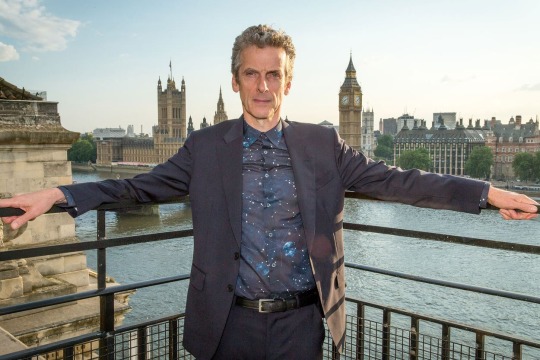
Peter Capaldi begins with an apology. He is sorry that the last time we met ��� on the Prague set of The Musketeers, BBC1’s adaptation of the Alexandre Dumas stories – he was obliged to be, as the late MP Alan Clark once famously put it, “Economical with the actualité”.
In spite of repeated Paxman-esque quizzing by me about what he was doing next, Capaldi had made like Michael Howard in consistently refusing to answer my questions.
The reason he was so resolute in rebuffing me was, of course, that he was sworn to secrecy about his next role. Only a handful of people in the whole universe knew that Capaldi was about to take on possibly the most sought-after part in British TV drama: Doctor Who. He was not even able to tell his own daughter the good news. So the actor would undoubtedly have been lined up in front of a firing squad of exterminating Daleks if he had spilt the beans to me.
Fortunately, we can both laugh about it now. “Yes, well, the last time we were talking I knew I couldn’t say anything!” Capaldi grins wryly by way of apology. “You were asking me all these questions about what I was doing next, and I had to just sit there and say nothing!”
He carries on that, “It was a fantastic piece of knowledge to have, but it was getting tiring lying to people all the time!” The fact that the information acquired the aura of a state secret only serves to underline the sheer magnitude of the show.
We are meeting at “DWHQ”, the nerve centre of the “Whoniverse,” the BBC’s Roath Lock Studios in Cardiff, where they film the show. You are greeted at reception by a Dalek, perhaps a chilling reminder of what the fate that awaits you if you reveal any spoilers.
Capaldi is just as you would hope. He is much warmer, but just as sharp as the character for which he was previously best-known, the exhilaratingly foul-mouthed spin doctor Malcolm Tucker in The Thick of It. Today he is sporting “electric shock” greying hair, grey trousers and a white T-shirt with an arty design that could have been lifted straight from an indie band’s album cover. The Scottish actor gives off a force field of charisma that may well be visible on the furthest edge of the galaxy. He twinkles like Regent Street during Christmas week.
At 56, Capaldi is the joint-oldest (with the first Doctor, William Hartnell) of the 12 main actors to be handed the Tardis keys, but he exudes a youthful exuberance that would shame performers half his age. The fact that Capaldi is of a certain age meant that many people were taken by surprise when he was announced last summer as the new Time Lord. But having watched his opening episode, “Deep Breath”, which goes out on BBC1 next Saturday, I can see exactly why the show-runner Steven Moffat went for his fellow Scot.
In this feature-length story, the Doctor and his companion Clara (Jenna Coleman) battle a dastardly foe in Victorian London. But, more than that, the episode is about Clara’s attempts to come to terms with a very different manifestation of the Doctor. His relationship with her has changed, but it is still at the heart of the piece and continues to be what makes this alien so human.
Capaldi’s Time Lord is angrier, edgier and spikier than more recent versions. At one point, he is at the helm of the Tardis, and Clara asks, “Where are we going?” “Into darkness,” he replies.
The actor himself describes his Doctor as, “More mysterious and not as user-friendly” as some of the recent incarnations. He may be darker, stranger and more alien, but my diagnosis of Capaldi’s Doctor is that he’s immensely compelling and will be a big hit with viewers of all ages.
Over the subsequent 31 years, the actor has shown tremendous versatility. He has played everything from the nicest man on the planet in Local Hero, to the nastiest man on the planet in The Thick of It and its movie version, In the Loop.
The actor sums up his career thus: “I was recently doing a voiceover for butter and they said, ‘Can you be a little less sinister?’ So that’s how far it’s gone. I’ve gone from an amiable geek in Bill Forsyth films to a ‘sinister’ butter salesman.”
Relatively late in his career, Capaldi now has a seriously high profile. Despite that, he laughs off the idea that he might decamp to LA: “Hollywood producers aren’t going to say, ‘Get me that swearing, grey-haired, headless chicken. We need him for our new High School Musical movie!’”
For all his memorable past roles, Doctor Who is special to Capaldi. He is happy to admit that he has been a “Whovian” his entire life. He jokes that the last time he got to play the Time Lord was as a nine-year-old in the playground. As an eager 15-year-old in February 1974, he wrote to the Radio Times praising the magazine for its coverage of Doctor Who. Now, 40 years later, the fan boy has fulfilled his childhood dreams.
Capaldi, who is married to the actress and TV producer Elaine Collins and has a grown-up daughter, confesses that, “I was totally geeky. But when you reach the age of 17 or 18, you move on and discover sex and drugs and rock’n’roll. I’m ashamed to say I had a kind of bonfire of the vanities. I had a huge collection of Doctor Who books, autographs and pictures, but I threw them all away to go and drink lager and eat curries. That was silly, wasn’t it?” He adds that, “I wish I’d known that one day the geek would inherit the Earth.”
But he did not abandon his first love forever. Capaldi, also a notable director who won an Oscar in 1995 for making the short film Franz Kafka’s It’s a Wonderful Life, says that, “I grew up with Doctor Who, The Beatles, Sunday Night at the London Palladium, school milk, bronchitis, smog, S buckle belts and all that stuff, so Doctor Who is part of my DNA. Although one goes away, now the Prodigal Son returns!”
There is no doubting the authenticity of his passion for all things Whovian. “It’s a very unusual story that somebody who was so into it would end up playing this role. It was such an unlikely event that I never considered it happening to myself. There are things I get excited about that only a fan boy could get excited about. I don’t need any help with the backstory.
“Even if I’d never played Doctor Who, as a kid, that’s what formed me as an actor rather than going to the Royal Shakespeare Company or doing Chekhov. It taught me to be an actor. I hope it’s all inside me, and it comes up.”
One other characteristic that Capaldi’s Doctor exhibits is a childish glee – which mirrors the emotions he experienced when he first heard he had won the role he had been coveting. The actor, who lives in North London, recalls that, “I was in Prague doing The Musketeers, and I read in the paper that Matt [Smith] was leaving. I just thought I wasn’t in that race at all. I thought the role was going to keep going in a younger direction.”
When the producers were making the final decision about the new Doctor, Capaldi remembers, “I was shooting as Cardinal Richelieu, so my phone had to be off. But I checked it, and I had nine messages. My agent finally got through and said, ‘Hello, Doctor.’ I went into the corner, I couldn’t tell anyone. I had to be very quiet.” He does admit, though, that, “When I was walking around Prague on my own, I was singing the Doctor Who theme tune to myself.”
If you take on the role of Doctor, you are also taking on some of the most dedicated fans this side of Planet Gallifrey. But Capaldi, who appeared as a Roman sculptor in a 2008 episode of Doctor Who entitled “The Fires of Pompeii”, says he is not bothered by the aficionados’ intense devotion to the show. “Doctor Who is so big, from the start I thought, ‘Don’t get involved in what people say.’ You simply do your best. Then it goes out into the world and you know that whether most people like it or not, somewhere someone loves you, and will always love you. The more everyone else hates you, the more they’ll love you! ‘He was my Doctor’, they’ll say.”
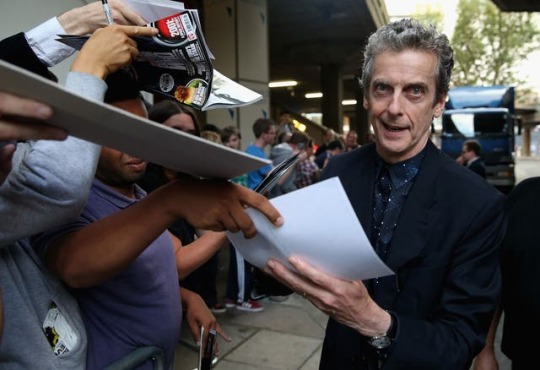
Capaldi goes on to ponder just why the show, first broadcast on BBC1 the night after President Kennedy was assassinated in November 1963, has lasted so long. “It’s got monsters in it. And they can change the leading actor. As Steven [Moffat] says, ‘If every show could do that, they’d all last a lot longer.’ Also, although it’s a sci-fi show, to me there’s an aspect of Grimm’s fairytale about it. The Doctor takes you deep into the forest where there are monsters, but he will return you to safety in the end. I think that colour in it is very potent, and it appeals to a family audience.
“Doctor Who has within it some of the cornerstones of the human psyche. He dies and is reborn. That’s a potent idea. It’s a show that young people can watch in which they are confronted with death, but in a way which is not grief-stricken.”
Finally, Capaldi pauses to reflect on his continuing sense of wonderment about Doctor Who, which has stretched from his earliest childhood to the present day. “I’m constantly amazed that it is me playing this role. I think, ‘I’m Doctor Who – how did that happen?’
“It’s a huge privilege and hugely exciting. I remember when I first came into the Tardis, I had to be very patient as the very nice props guys showed me how to work the Tardis. I was thinking, ‘I know how to work the Tardis. I’ve known for a long time, probably longer than you, so you don’t need to tell me!’ Every day is amazing.”
So how does the actor feel about still having so much fun at the age of 56? Capaldi ends – as he began – with an apology. “I feel guilty. My wife says to me, ‘You still enjoying it?’ ‘Yeah, sorry!’”
Series 8 of ‘Doctor Who’ starts next Saturday on BBC1
15 notes
·
View notes
Text
New Red Dwarf Challenge
Day 26: BBC Era or DAVE Era
Both, I refuse to choose.
I know a lot of people would say the BBC era and I understand that, but a reminder that that includes Series VII and VIII. Most people, if they like one of those, dislike the other.
The BBC era may arguably have higher highs but it also has lower lows as far as I’m concerned. Yes, I’d watch my favourite BBC ep “Back To Reality” over my favourite Dave era ep “The Promised Land” if made to choose, but I’d also watch the Dave era nadir “Timewave” over the BBC era nadir “Krytie TV”. This is a nuanced question, in other words.


It also depends which version of our Boyz you prefer - young and relatively hopeful or older and resigned but usually relatively content.
And in the case of Lister and Rimmer, in their “I hate you” stage or their “We’re married but I still hate you sometimes” stage.



(All gifs except the last one made by myself using this site https://smegadrive.ganymede.tv/)
14 notes
·
View notes
Text

Crossover list (last update: April/08/2025)
※ This list is just a guide to what I have some knowledge about or is part of my other interests. If you are able to explain me something I do not have much knowledge about, maybe we can write those muses together!! I like to be able to insert my digi-muses (canon and OC) into those worlds sometimes, making it a specific AU thing.
※ If I can't imagine them living in that universe, or can't figure out how to make their canon/OC meet your muse, I'll have to refuse to write with that universe/muse of yours (but we can still try other muses of yours, so don't worry!)
※ This list may be updated with a few new series/franchises I'd like to do a crossover/AU with, or has knowledge about them.
Digimon series/franchise in general (I will RP with any kind of canon or OC btw)
Pokemon (Special manga; Journeys; Horizons; Sword/Shield mostly) ※ I'm game with a few pokemon anime + game as long you are up to explain me about them & their source material, and OCs?
Super Sentai (Dekaranger; Magiranger; Go-Onger; Shinkenger; Gokaiger; Toqger; Kyuranger; Lupinranger vs Patranger; Ryusoulger; Kiramager; DonBros; KingOhger)
Kamen Rider (Ryuki; Kiva; W/Double; Fourze; Gaim; Drive; Ex-Aid; Build; Zi-O; Geats; SKR)
Powerpuff Girls Z
Grand Chase
Elsword
Sonic (most of the games; IDW; Boom TV Series, X TV anime; Prime; Movie Universe)
Rayman (Captain Lasehawk v. is a big NO + block)
Pretty Cure (Futari wa; Fresh; Smile; HUGtto; Star ✰ Twinkle; Higaru Sky!)
Kill la Kill
Tengen Toppa Gurren Lagann
Nagi no Asukara
Gravity Falls
ClassicaLoid
FMA:B
My Hero Academia/Boku no Hero Academia
Little Witch Academia
Persona 5
Ducktales (2017)
The Owl House
Promare
Your Name.
BNA
Magic Kaito 1412 (anime)
Kamikaze Kaitou Jeanne (anime)
Saint Tail (anime; have yet to read the manga!!)
Spy x Family
Wedding Peach (anime)
Puella Magi Madoka (TV series only, i have yet to watch the movies!!)
Tokyo Mew Mew (OG anime or New anyway)
[some franchises/series that i prefer to not put here, so if you get my follow this means i’m OK with you]
FANDOMLESS OCs: PLEASE, have a PAGE about your world/muse so I can read them and see if my muses could work in your world. If no information is present in your blog, it will make hard to interact with your muse, sorry!
⚠ List for the Biggest NOPE + block if you insist using muses from these things:
Vivziepop content
Captain Lasehawk, as mentioned before (i hate how it portrayed Rayman in it) & Rabbids (not very fan of them)
AoT muses or AUs
JKR content (it saddens me to add this here, HP was part of my childhood and now i want to not be associated with it anymore)
BBC shows (liked one of those shows in the past, but i'm not very comfortable with them alas)
Roleplaying with real-life actors/idols/people in gen as if they were fictional characters (live action characters such as Kamen Rider/Sentai/etc are OK, but i'm uncomfortable with real-live faceclaims)
LARP or self-inserts (those make me nervous and uncomfortable)
Any Angel/Demon AU versions of any human digimon character due to past experiences
4 notes
·
View notes
Text
"VANITY FAIR" (2018) Review
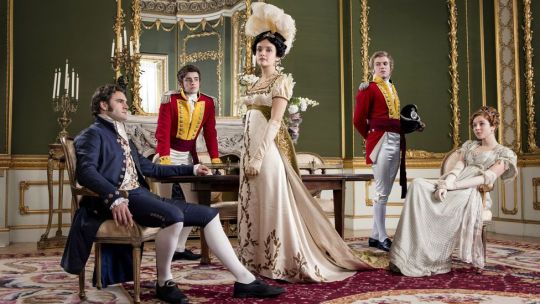
“VANITY FAIR” (2018) Review
When I had first heard that the ITV channel and Amazon Studios had plans to adapt William Makepeace Thackeray’s 1848 novel, “Vanity Fair”, I must admit that I felt no interest in watching the miniseries. After all, I had already seen four other adaptations, including the BBC’s 1987 production. And I regard the latter as the best version of Thackeray’s novel I had ever seen.
In the end, my curiosity got the best of me and I decided to watch the seven-part miniseries. In a nutshell, "VANITY FAIR" followed the experiences of Rebecca "Becky" Sharp, the social climbing daughter of an English not-so-successful painter and a French dancer in late Georgian England during and after the Napoleonic Wars. The production also told the story of Becky's school friend and daughter of a wealthy merchant, Amelia Sedley. The story begins with both young women leaving Miss Pinkerton’s Academy for Young Ladies. Becky managed to procure a position as governess to Sir Pitt Crawley, a slightly crude yet friendly baronet. Before leaving for her new position, Becky visits Amelia's family. She tries to seduce Jos Sedley, Amelia's wealthy brother and East India Company civil servant. Unfortunately George Osborne, a friend of Jos and son of another wealthy merchant, puts a stop to the budding romance.
While working for the Crawleys, Becky meets and falls in love with Sir Pitt’s younger son, Captain Rawdon Crawley. When Sir Pitt proposes marriage to Becky, she shocks the family with news of her secret marriage to Rawdon. The couple becomes ostracized and ends up living in London on Rawdon’s military pay and gambling winnings. They also become reacquainted with Amelia Sedley, who has her own problems. When her father loses his fortune, George's own father insists that he dump Amelia and marry a Jamaican heiress. George refuses to do so and thanks to his friend William Dobbin's urging, marries Amelia. Mr. Osborne ends up disinheriting George. However, the romantic lives of Becky and Amelia take a backseat when history overtakes them and their husbands with the return of Napoleon Bonaparte.
I wish I could say that the 2018 miniseries was the best adaptation of Thackery's novel I had seen. But it is not. The production had its . . . flaws. One, I disliked its use of the song "All Along the Watchtower" in each episode's opening credits and other rock and pop tunes during the episodes' closing credits. They felt so out of place in the miniseries' production. Yes, I realize that a growing number of period dramas have doing the same. And quite frankly, I detest it. This scenario barely worked in the 2006 movie, "MARIE ANTOINETTE". Now, this use of pop tunes in period dramas strike me as awkward, ham-fisted, unoriginal and lazy.
I also noticed that producer and screenwriter Gwyneth Hughes threw out the younger Pitt Crawley character (Becky's brother-in-law), kept the Bute Crawley character and transformed him from Becky Sharp's weak and unlikable uncle-in-law into her brother-in-law. Hughes did the same with the Lady Jane Crawley and Martha Crawley characters. She tossed aside the Lady Jane character and transformed Martha from Becky's aunt-in-law to sister-in-law. Frankly, I did not care for this. I just could not see characters like Bute and Martha suddenly become sympathetic guardians for Becky and Rawdon's son in the end. It just did not work for me. I have one last problem with "VANITY FAIR", but I will get to it later.
I may not regard "VANITY FAIR" as the best adaptation of Thackery's novel, I cannot deny that it is first-rate. Gwyneth Hughes and director James Strong did an excellent job of bringing the 1848 novel to life on the television screen. Because this adaptation was conveyed in seven episodes, both Hughes and Strong were given the opportunity retell Thackery's saga without taking too many shortcuts. The miniseries replayed Becky Sharp's experiences with the Sedley family, George Osbourne, and the Crawley family in great detail. I was especially impressed by the miniseries' recount of Becky and Amelia's experiences during the Waterloo campaign - which is the story's true high point, as far as I am concerned. Also, this adaptation had conveyed George's experiences during Waterloo with more detail than any other adaptation I have seen.
Aside from the Waterloo sequence, there were other scenes that greatly impressed me. I really enjoyed those scenes that featured the famous Duchess of Richmond's ball in the fourth episode, "In Which Becky Joins Her Regiment"; Becky's attempts to woo Jos Sedley in the first episode, "Miss Sharp In The Presence Of The Enemy"; the revelation of Becky's marriage to Rawdon Crawley in "A Quarrel About An Heiress"; and her revelation to Amelia about the truth regarding George in the final episode, "Endings and Beginnings". There were people who were put off that the series did not end exactly how the novel did - namely the death of Jos, with whom Becky had hooked up in the end. I have to be honest . . . that did not bother me. However, I was amused that Becky's last line in the miniseries seemed to hint that Jos' death might be a possibility in the near future.
The production values for "VANITY FAIR" struck me as quite beautiful. I thought Anna Pritchard's production designs did an excellent job in re-creating both London, the English countryside, Belgium, Germany, India and West Africa between the Regency era and the early 1830s. Not only did I find the miniseries' production values beautiful, but also Ed Rutherford's cinematography. His images struck me as not only beautiful, but sharp and colorful. I would not say that Lucinda Wright and Suzie Harman's costume designs blew my mind. But I cannot deny that I found them rather attractive and serviceable for the narrative's setting.
One of the production's real virtues proved to be a very talented cast. "VANITY FAIR" featured some solid performances from it supporting players. Well . . . I would say more than solid. I found the performances of Robert Pugh, Peter Wight, Suranne Jones, Claire Skinner, Mathew Baynton, Sian Clifford, Monica Dolan, and Elizabeth Berrington to be more than solid. In fact, I would say they gave excellent performances. But they were not alone.
Michael Palin, whom I have not seen in a movie or television production in years, gave an amusing narration in each episode as the story's author William Makepeace Thackeray. Ellie Kendrick gave a very poignant performance as Jane Osborne, who seemed to be caught between her loyalty to her bitter father and her long-suffering sister-in-law. Simon Beale Russell gave a superb, yet ambiguous portrayal of the warm and indulgent John Sedley, who also had a habit of infantilizing his family. Frances de la Tour was deliciously hilarious and entertaining as Becky Sharp's aunt-in-law and benefactress Lady Matilda Crawley. I could also say the same about Martin Clunes, who gave a very funny performance as the crude, yet lively Sir Pitt Crawley. One last funny performance came from David Fynn, who gave an excellent portrayal of the vain, yet clumsy civil servant, Jos Sedley. Anthony Head gave a skillful performance as the cynical and debauched Lord Styne. I thought Charlie Rowe was superb as the self-involved and arrogant George Osborne. Rowe, whom I recalled as a child actor, practically oozed charm, arrogance and a false sense of superiority in his performance as the shallow George.
I have only seen Johnny Flynn in two roles - including the role of William Dobbin in this production. After seeing "VANITY FAIR", it seemed that the William Dobbin role seemed tailored fit for him. He gave an excellent performance as the stalwart Army officer who endured years of unrequited love toward Amelia Sedley. Tom Bateman was equally excellent as the charming, yet slightly dense Rawdon Crawley. At first, I thought Bateman would portray Rawdon as this dashing, yet self-confident Army officer. But thanks to his performance, the actor gradually revealed that underneath all that glamour and dash was a man who was not as intelligent as he originally seemed to be. Amelia Sedley has never been a favorite character of mine. Her intense worship of the shallow George has always struck me as irritating. Thanks to Claudia Jessie's excellent performance, I not only saw Amelia as irritating as usual, but also sympathetic for once.
Television critics had lavished a great deal of praise upon Olivia Cooke as the sharp-witted and manipulative Becky Sharp. In fact, many have labeled her performance as one of the best versions of that character. And honestly? I have to agree. Cooke was more than superb . . . she was triumphant as the cynical governess who used her charms and wit in an attempt to climb the social ladder of late Georgian Britain. I would not claim that Cooke was the best on-screen Becky I have seen, but she was certainly one of the better ones. I have only one minor complaint - I found her portrayal of Becky as a poor parent to her only son rather strident. Becky has always struck me as a cold mother to Rawdon Junior. But instead of cold, Cooke's Becky seemed to scream in anger every time she was near the boy. I found this heavy-handed and I suspect the real perpetrator behind this was either screenwriter Gwyneth Hughes or director James Strong.
I have a few complaints about "VANITY FAIR". I will not deny it. But I also cannot deny that despite its few flaws, I thought it was an excellent adaptation of William Makepeace Thackeray's novel. Actually, I believe it is one of the better adaptations. "VANITY FAIR" is also one of the best period dramas I have seen from British television in a LONG TIME. And I mean a long time. Most period dramas I have seen in the past decade were either mediocre or somewhere between mediocre and excellent. "VANITY FAIR" is one of the first that has led me to really take notice in years. And I have to credit Gwyneth Hughes' writing, James Strong's direction and especially the superb performances from a first-rate cast led by Olivia Cooke. It would be nice to see more period dramas of this quality in the near future.
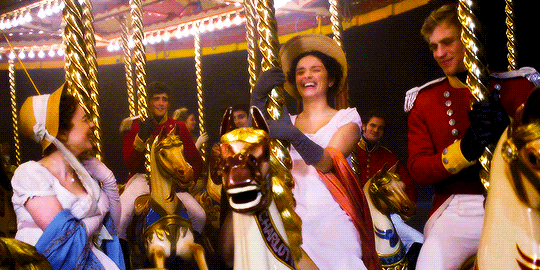
#vanity fair#william makepeace thackeray#michael palin#olivia cooke#tom bateman#johnny flynn#claudia jessie#james strong#anthony stewart head#charlie rowe#ellie kendrick#napoleonic wars#period drama#period dramas#costume drama#suranne jones#history#frances de la tour#simon beale russell#martin clunes#elizabeth barrington#monica dolan#david flynn#claire skinner#sian clifford#robert pugh#martin baynton#richie campbell
10 notes
·
View notes
Text
My Completely Unasked but Needed Review of BBC's Dracula "The Dark Compass" Subplot
I had no real interest in watching the BBC's Dracula, especially since I heard not so good things from it, but after seeing the post by @luanna801 (x) I was compelled since Jack is one of my favorites from Dracula and I'm growing an interest in the actor Matthew Beard. So I figured I watch "The Dark Compass" with all the Jack/Lucy bits, and, well, there's a lot to discuss here. Warning, very long post, please bear with me, I have a point.
Storyline:
Now set in the modern day, we see Jack getting ready in his house, ignoring the Jonathan Harker foundation, but picks up when he sees Lucy is calling him. She says that he can bring someone with him to the club tonight, and we see that they are clearly not in a romantic relationship, despite Jack having her picture as his home screen. A shot to Lucy in her own room taking selfies, ignoring her mother who is calling for her.
Jack arrives at the club alone, and has hearteyes for Lucy, who is dancing. She then introduces her friends to Quincy Morris, an American from Texas, and he's rich. Jack and Quincy talk, where we find out Jack is a student and junior doctor, wanting to specialize in mental health. Quincy doesn't seem to really care much for Lucy, saying he probably wouldn't be interested in her if she was not pretty, the same why she probably wouldn't be interested in him if he was poor. Outside, Zev, a gay friend of Lucy, tells her that he thinks she's a bit mean to Jack, who is clearly is in love with her, and she responds coldly. He tries to make Jack feel better, but after seeing Quincy propose, Jack accepts the call from the Harker foundation.
He is a student of Zoe Van Helsing, who suggested to him being part of the program for easy money to help his schooling, and they are debriefed on Dracula's return. Dracula is released from their custody because of lawyer Renfield, and Dracula steals Jack's phone, starting a conversation with Lucy. Now on her bachelorette party, Lucy decides she'll met Dracula, disregarding the fact that she is getting married real soon. They have a discussion of death, and Lucy is so disinterested in death that Dracula is drawn to make her a bride.
Jack is called by Zev to check on Lucy as she refuses to see doctors, and he sees the bite marks, informing Zoe. Lucy dies, and is cremating, which is something Dracula warned her about. Zoe and Jack confront Dracula, and Lucy turns up, unaware that she is no longer the beautiful young woman she was, but a horribly burned shell of herself. Jack, who was at first shocked and frightened at an undead Lucy, offers to kiss Lucy, reminding her that he had loved her and would always love her. They kiss and she feels the wooden stake in his hands, but rather than being upset, she begs him to kill her, and does, ending her misery. Dracula is mildly annoyed at her death, calling her an experiment, but Jack tells him that Lucy was never Dracula's or even Jack's. Zoe then, realizing what Dracula's weakness is, tells Jack to go, and despite his initial refusal, he goes when he sees the sun rising, leaving the place, saying "It's going to be a beautiful day."
Questions/Comments:
Ok, so this was, not great. Jack, played by Matthew Beard, was great, and it is such a shame that a Jack this good is in a plot line that is so bad. And really, the biggest flaw is in Lucy's character. In the book, Lucy is a sweet, innocent, and loving individual who hates to make anyone unhappy, but here, she is the total opposite of that. Something I can give Coppola's version of Lucy is that, while she is a flirt/promiscuous, is that she is at least kind. She cares deeply for Mina, is kind to her two other suitors and doesn't make them feel bad for not choosing them, but BBC's Lucy is so mean for no reason. She treats Jack poorly which made me wonder why he is so in love with her, especially since she barely takes note of him through the episode unless it's to laugh at him. This is not the fault of the actress, I think the actors were good, it's just their characters were so poorly written.
I am not saying Lucy owes Jack anything, but she is so mean about his feelings that it really bordered on bullying. I also am confused by the nature of their relationships. They are friends, but they slept together, but they still are hanging out? Is this an allosexual thing that am not getting? I wished that there was some explanation of how they were friends and exactly why he continues to hang out with her, even if it was for a sad, pathetic reason.
I also hated what they did to Quincy, because in the book he was a good character and, like Jack, loves her but respects her choice to choose Arthur. Here, he's a jerk who only seems to care about Lucy because she's beautiful and leaves immediately after her funeral back to America. The only nice characters in this segment was Jack and Zev, and they really got the short end of the stick here.
The one thing I can say I liked was the switch in the end with the "Bloofer Lady". In the book, when Lucy comes back, the children she attacks refer to her as "Bloofer Lady" and subverted expectations here was nice, but the build up to it was not great, because they were expecting the audience to care about her.
Changes I'd Make:
Keeping the general plot line, here is what I would have done. Have Lucy call Jack and instead of saying he's stalking her because he's being sentimental (weird, but whatever) have her be nicer to him, maybe asking if he's tired and if work is draining him, he doesn't have to come, but he insists because she wants him there. Have her not be aware that he has romantic feelings for her until the end, and she just thinks he's just being a great friend. Then we can keep Lucy being an influencer, but is unhappy about how people around her only see her as a pretty face, and not seeing her as anything more. Taking a cue from @forthegothicheroine make Mrs. Westenra be a bit antagonistic by fueling Lucy's insecurity by saying how she doesn't have to go to school when she could just marry a rich man, an easy thing for her since she's so pretty.
When Jack does to the club, have Lucy be so happy he's there, and introduce Quincy to everyone. Have it be that she and Quincy have been talking and having a long distance relationship and they finally met in person. The talk between Jack and Quincy can reveal more of the relationships the men have with Lucy. Maybe Jack met Lucy in college where he was a tutor to her and they grew to be friends. Quincy and she met on a dating app and although it's been three months, Quincy is nuts about her. Imagine their relationship being similar to the typical high school quarterback with the head cheerleader, but while they look like a good couple, one of them is not really happy because they want more. This would make Quincy a lot nicer, where he is misguided in what he believes Lucy is and loves her for that.
Zev sees that Jack is in love with Lucy, and tries to comfort him, even suggesting that he say something, considering that Lucy and Quincy have only dated for a short time, can't be serious. But then Quincy proposes, and Jack, disheartened, goes to the Harker foundation. Dracula still steals his phone, but instead of Lucy talking to him as a flirt, she has a one conversation with him, and intrigued, Dracula stalks her through her social media and sees she is out with her friends for her bachelorette party and goes to find her.
Lucy, having a moment of panic, realizing she really does not love Quincy and is only marrying him because everyone is expecting it of her and he is a good man, but he really doesn't know her, goes outside for fresh air. She meets Dracula, and feeling like she wants to escape, maybe wants to die, Dracula offers her the way out. Zev finds her, and asks Jack to check in on her. Let there be a nice moment between them, where Lucy is appreciative and sorry to drag him into this, but he dismisses her worries and checks on her. Seeing the marks he calls Zoe and Lucy dies.
After the funeral, Jack checks in on a distraught Quincy, who is devastated by her death, can't bear to stay in England so decides to return home, but says that if Jack's ever in America to look him up (which would be a nice reference to the friendship in the book). Keep Lucy being burned and meeting with Dracula, but have her interactions with Jack and Zoe a lot nicer. She'd say how happy she was to see Jack and be introduced to Zoe, who she knows because Jack talks about her.
Lucy would say to Jack how she could only imagine how happy her mother will be now, now that her little girl will always be beautiful, and people will always love her. She'll find out she's burned because Zoe suggests she take a picture to send to her mom, and she'll see that she is no longer beautiful. Have Dracula backhandedly comfort her but Jack to step in and say he'll kiss her, which leads to him admitting his feelings, making Lucy realize not only that Jack has been in love with her for the longest time, but also that despite how she looks, he still loves her for her. This would make her story more bittersweet, as she would have at last known that someone loved her for her, but to die when she did get that love.
I think this direction would have made it much better and less insulting to the original characters than the BBC did to them.
Tagging those who I think might be interested: @forthegothicheroine @luanna801 @spider-xan @the-timelord-a-tardis-stole @angelsbesides @spookbot
4 notes
·
View notes
Text

WHAT ARE SOME SOURCES OF ENTERTAINMENT / MEDIA / SPORTS / MUSICIANS / HOBBIES THAT YOU'D FIND ON NEW JAKARTA?

Hey anon!
I love all these lore-based questions SO MUCH. I'm going to answer it per district since there are definitely some stark difference.
in SORA; there tends to be a lot more traditional media / entertainment, but also more EARTH NEWS coming in through stronger satellites. Sports-wise there is an emphasis on baseball, hockey, golf, and football, but always a resignation that the MARS TEAM will never be able to beat any of the Earth teams in competitions. A lot of Music from Earth is well played in places around Sora, with establishments having more to choose from and playing to the tourists and delegations rather than to the locals, despite Mars / New Jakarta having a very vibrant scene of their own. Hobbies that are most prevalent in Sora - though everyone will tell you it isn't - are tennis, gambling, night clubs, and recreational drugs.
in the MAWAR DISTRICT; they get some EARTH NEWS and media, but not a lot. Most television channels are under the control of the UNN, so most people go to Mars' version of Youtube for entertainment. Kids are most often found at the Arcade or sneaking off to see the RACES in UKUMU SLUMS. Sports-wise there is Baseball, Football, Hockey, and Martial Arts that are most played and watched. There are plenty of Local ( either from NEW JAKARTA or MARS ) musicians with music ranging the whole spectrum that play the biggest venues in the city since very few EARTH artists see the benefit of travelling to Mars for a show. J-POP, INDO-POP, METAL, and BOLLYWOOD are the genres of the biggest stars, but TECHNO and R&B are played in the biggest clubs. Hobbies-wise, there is a lot of emphasis on getting out of the house: going to the beach for a swim, AKUMU SLUMS for the RACES and RING, the bars, the clubs, the casino's. MAWAR DISTRICT in that way resembles Japanese culture a lot, where people are home late and drinking / at arcades often. Also: so many SOAP OPERAS ( called Sinetron, as they are called in Indonesia ), most only Mars' version of Youtube, but also a lot on the UNN.
in the AKUMU SLUMS; here you will find the most pirated tv-channels, radio channels, and other sources of entertainment. Mars' version of Youtube is widely used and hooked up to any tv. There is very little interest in following EARTH NEWS or even the UNN, instead there are pirate channels that bring news of all over Mars. The RACES and RING are most often visited by locals for sports matches, but there are also a lot of famous SKATERS, BMX'ERS, and FOOTBALL. BARTORI is perhaps the most visited place in the lower district, if only because every other place isn't static. A lot of people go out to drink at night, gamble, watch videos together, and watch live shows. Music of the biggest artists from NEW JAKARTA / MARS is most heard around these places, with the most daring of them actually doing live shows at the Races and the Ring.
Note: Football is not American Football, but Soccer.
Fun facts: NEW JAKARTA was offered a spot for EUROVISION but they refused. The best professional athletes are often stolen by EARTH to participate internationally for either INDONESIA, JAPAN, or AUSTRALIA. EARTH NEWS is mostly BBC World and Al Jazeera. Pirate Radio is inspired by Danger Days: The True Lives of the Fabulous Killjoys.
Note: admin Niek might make a playlist for music at some point. ( Suggestions always welcome! )
I hope this helped anon! I had far too much fun with this and reading up on Japanese, Indonesian, and some Australian culture. When we open members will be able to add their own little tidbits and fun information to the lore in our future Lore Channel.
admin Niek.
#new rp#lsrp#scifi rp#city rp#crime rp#literate rp#plot driven rp#fantasy rp#semi appless rp#loreask#answered
0 notes
Text

Critics slam BBC Rebus reboot for 'reimagining' Ian Rankin's popular detective as an 'unhinged thug'
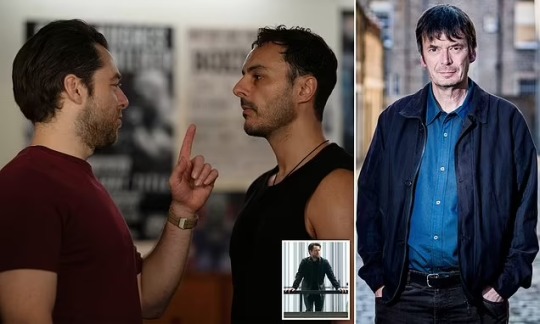
By Padraic Flanagan
He's the maverick cop beloved by millions. But John Rebus may lose fans in a BBC reboot that portrays him as an 'unhinged thug'.
Critics reacted with horror after viewing last night's brutal opening scenes of Rebus, written by Gregory Burke, who himself has a violent past.
The BBC1 series is billed as a 'reimagining' of Ian Rankin's popular Edinburgh-set detective novels, and now follows the policeman's exploits in his younger days.
The first episode of the prequel opens with Rebus trying to suffocate a notorious gangster in the back of an ambulance. Only the intervention of a commanding officer prevents the killing.
'The BBC's Rebus reboot is so violent and uncompromisingly bleak that I had to force myself to keep watching past the first five minutes,' said appalled television critic Kathryn Flett. 'I suspect discerning viewers won't care, they'll recoil. And switch off.'
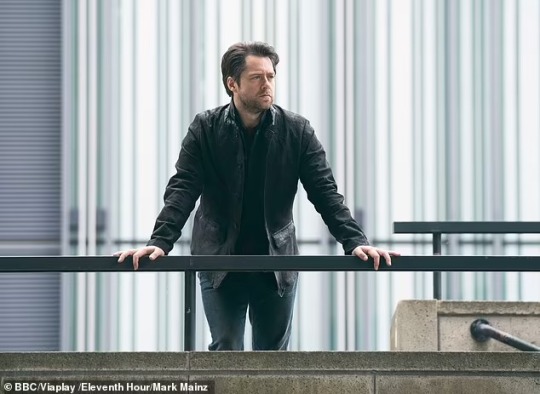
Critics reacted with horror after viewing last night's brutal opening scenes of Rebus, written by Gregory Burke, who himself has a violent past. Pictured: Richard Rankin starring as John Rebus
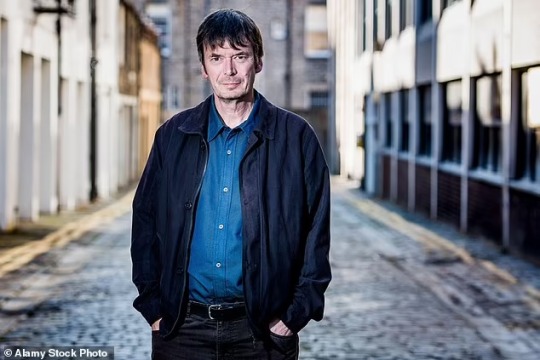
The BBC1 series is billed as a 'reimagining' of Ian Rankin's (pictured) popular Edinburgh-set detective novels, and now follows the policeman's exploits in his younger days
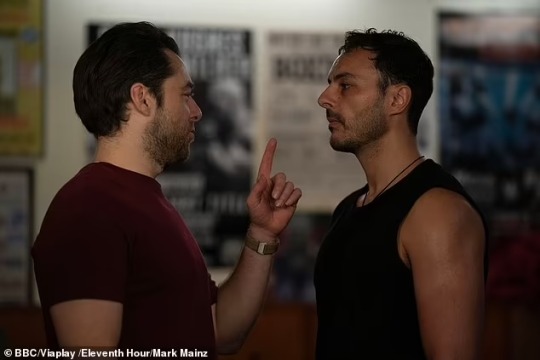
The six-part drama, starring Outlander's Richard Rankin as Rebus. Pictured: John Rebus and Darryl Christie face off in the show
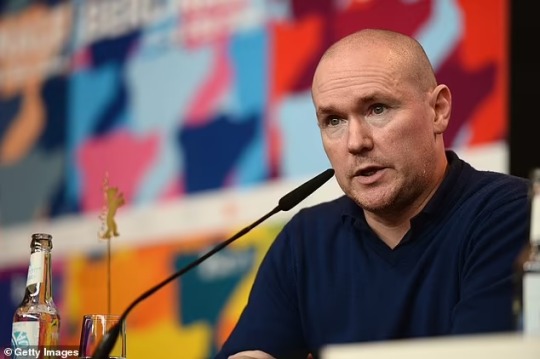
Writer Mr Burke (pictured in 2014), 56, was banned from the campus of Stirling University where he was studying politics in the 1980s after committing an assault on 17-year-old fellow student Mark Campbell
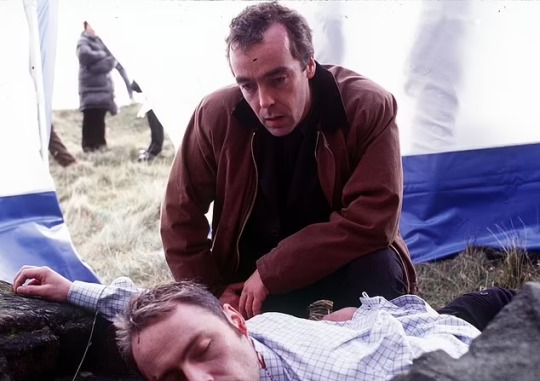
The reboot is a modern update of the hugely popular ITV adaptations starring John Hannah (pictured starring in the show in 2001) and Ken Stott
She added: 'I didn't want to spend time with Gregory Burke's version of Rebus because he is patently a violently unhinged thug and life is far too short to be repulsed in the name of entertainment.'
The six-part drama, starring Outlander's Richard Rankin as Rebus, is a modern update of the hugely popular ITV adaptations starring John Hannah and Ken Stott.
Writer Mr Burke, 56, was banned from the campus of Stirling University where he was studying politics in the 1980s after committing an assault on 17-year-old fellow student Mark Campbell.
Mr Campbell spent three days in intensive care and his family said the 'unprovoked' attack was so severe that he would have died had onlookers not intervened.
Their anger reignited in 2009 when Stirling University offered Mr Burke an honorary degree.
The Dunfermline-born playwright, who wrote the Olivier Award-winning Black Watch, declined the accolade. The victim's family said the writer had refused to apologise for the attack.
Mr Burke blamed the incident on the 'culture shock' of moving from a tough area of Fife to the softer academic environment.
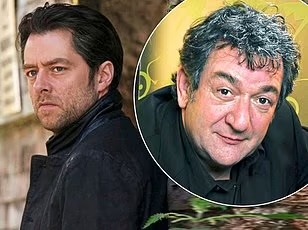
He declined to comment about the attack when approached by The Mail on Sunday.
It took longer than expected. This was to be await. As a Rebus fan, if you have seen the originals, you must admit that you enjoyed John Hannah's performance as DI Rebus and Ken Stotts, portraying the character, who seemed suited to life in the police force. The John Rebus books and the characters were fantastic because Rebus, as we know him, is a product of his own time. Rewrites rarely match the originals; Reading the books is a better option 📚
How do You attract police attention when driving Police make the driver do a breathalyser 😂😂
#Rebus
Posted 20th May 2024
1 note
·
View note
Text
Regrettably, the actual first four episodes of the very first season are not yet available for streaming. The son of the writer of the first drafts is throwing a major hissy fit over what he feels he is owed, and as such, has refused to allow the BBC to stream them. So we can't take a look at An Unearthly Child yet. With that said:
Season 1 The Daleks: The Dead Planet
Off we go! Slowly! This is a story I'm already familiar with, thanks to the abridged version we saw in the first Peter Cushing film, Dr Who And The Daleks. I'll try not to talk about the films too much, much as I do like them. Now I wasn't sure how to approach reviewing the first Doctor's stories. Do I review each story as a whole, or bit by bit, since each episode has its own title? I decided on the latter, until they start becoming episode 1, episode 2, etc. Having left the Stone Age, the TARDIS lands somewhere with extremely high radiation levels, which the crew fail to realise having left to explore too early. We find ourselves exploring a petrified jungle bordering a huge city which shows no sign of life, and the Doctor is itching to explore, but Susan is convinced there's something out there in the jungle. Circumstances force the crew to head into the city, and when they separate, Barbara comes face to face with unseen terror... This is a rather slow one, but has some pretty solid worldbuilding as we see the state of Skaro without being told necessarily how it got like this. The characterisation is unusual, as the Doctor is merely a kooky, slightly grumpy old man who's dragged Susan and her teachers off on a time and space hopping adventure. He's no leader here, Ian seems to be looking to fill that role as the voice of reason, the straight arrow, the solid 60s man. Susan and Barbara fill the stereotypical classic companion roles here. They ask questions, point out the obvious, get in trouble and need to be rescued, and later companions are also there to make the Doctor look very clever, but Susan handles this part quite well herself, without being annoying about it. The highlight of this one for me is probably the famous cliffhanger as Barbara is backed against the wall by something we can't see, but has a probing mechanical arm, and we fade to black on her bloodcurdling scream. What must people watching this originally have thought? 60 years on, we know the overall name of this story, we know what a Dalek is, we know their deal, but the British public had never seen one before. What did they think was on the other end of that arm? Did ANYONE know what was about to be unleashed? We're off to a good start though. Join me next time as we meet The Survivors.
1 note
·
View note
Text
I lost the first draft of this post so bfhsbfbng
anyways I gotchu
it is absolutely shocking how many pieces of Holmesian media (and even posts on this app) entirely misinterpret Holmes and Watson's relationship and dynamic. I'm just a tad convinced its flanderization(like a lot of their minor traits are blown out of proportion for no goddamn reason)? with both of them, but ESPECIALLY Watson. Watson is the least recognized for his actual canonical personality and so adaptations will often just... make shit up about him. unfortunately because of this, the common interpretation with the public is this "hyper annoyed with Holmes, constantly not understanding things" kind of character which is... tbh the opposite of his actual characterization from the books.
Watson is described as being calm and collected, patient, understanding, and best of all INTELLIGENT. he might not fully keep up with Holmes but he's a fast learner, it's part of why Holmes likes him, and part of why Watson likes Holmes
they get eachother on a level nobody else does, and yet a lot of adaptations seem to utterly miss this and make them polar opposites who don't even have an "opposites attract" type deal. they just straight up... don't like eachother. which is disappointing! Watson's constant distaste for Holmes in some adaptations is an attempt at mirroring his occasional (and often fully warranted) annoyance at Holmes in the books which always makes it seem like their friendship is one sided. IT ISNT
In A Study In Scarlet, their dynamic is basically that they are studying eachother somewhat. they don't fully understand eachother yet, but already they like eachother.
past that however they absolutely adore eachother. Holmes is not past praising Watson for any and everything he sees fit, and he simply perceives it as being a natural truth of his best friend.
in the final problem, Holmes' reasoning for letting Watson leave before his death isn't selfishness or trying to seem cool like many adaptations make it seem. he GENUINELY thought he was going to die, he was leaving Watson behind to spare him from potential physical harm because the concept of his Watson dying is so much more repulsive to him than his own death. and Watson is so distraught over Holmes' "death" that The Final Problem reads like the words of a man who's lost his whole life. and, to his credit, he kind of has
Watson constantly seems just. smitten, with Holmes, about everything.
frankly, their love for eachother is so. present. in the original stories. that when I watch something like (and yes, I'm going to dig at it again) the last 2 seasons of Sherlock, I just feel... disappointed. these men are not close, they would not kill or die for eachother like they do in the books. there's a real "tell don't show" feel with the writing where they tell you the 2 care about eachother, but then most of their actions really don't feel that way.
and I complained about this earlier but the amount of posts I've seen of people saying that Watson's version of the empty house is false and he actually beat holmes up or that he should have beat him up is INSANE. it speaks to how people don't understand their relationship that people think Watson would or should have PHYSICALLY HARMED HIS THOUGHT-TO-BE-DEAD BEST FRIEND??
modern holmesian media has rotted the brains of fans. no Holmes and Watson do not mutually dislike eachother. no Watson is not lesser than Holmes. no, they do not fight often. all of that is entirely invented to up the drama of their dynamic and get rid of their original characterizations because show writers are cowards(which, no, this isn't just a complaint I have of BBC Sherlock, though in some of the episodes they definitely show this)
also because so many people refuse to read the books for whatever reason, they often get their information from more fast paced media that doesn't focus on their actual dynamic. I'd say when it comes to more fast paced media, the only thing currently getting their dynamic right (so far) is Sherlock & Co, which has an absolutely lovely vibe for the characters (a lot of people compare them to bbc sherlock, I disagree, its similar in that it's modern and their beginning dynamic is good, but I can't see many similarities past that tee bee aitch)
also just so it doesn't make it seem like I'm just making a hit piece of bbc sherlock again, since ive mentioned it a bunch: the Buckingham Palace scene is so in character I can imagine it being in acd canon, that's the best example of their canon dynamic in the whole show and I think about it fondly almost every day.
tldr: they really really like eachother in canon, and in adaptations they hate eachother because people fuck up their personalities (especially Watson's) and it pisses me off an unnecessary amount
anyone who wants to add, feel very very free to! I'm sure I've missed stuff
"we need a canon johnlock show!!!" most of yall can't even handle them being close friends without making them hate eachother because you fundamentally misunderstand their relationship. sit down (I am entirely willing to expand on this btw if anyone wants me to)
#acd canon#acd holmes#acd sherlock holmes#they are friends. they love eachother. end of story#also yeah i know this is a long post but I feel very strongly about their relationship
331 notes
·
View notes
Text
if I were trapped on an island with a bunch of strangers and we were all getting murdered one by one, I would simply build a raft and get the hell out of there. rip to vera claythorne, emily brent, phillip lombard, mr and mrs rogers, anthony marston, general macarthur, dr armstrong, AND justice wargrave but I’m different
#and then there were none#agatha christie#watching the bbc version rn it's SO GOOD#and then there were none 2015#i would refuse to die and that's that on that
43 notes
·
View notes
Text
on philip pullman's approach to analyzing human nature vs jack thorne's
(posting here per request since the conversation on discord got, uh, distracted before i could put my thoughts into words)
bbc/hbo's his dark materials has expended on a lot of characters and plotlines that were only hinted at - or did not exist at all in many instances - in the his dark materials book trilogy. one of the characters that was impacted by that a lot - if not the most of the whole cast - is mrs. marisa coulter. and while many media outlets and fans alike have been very pleased with the show's version of marisa in comparison with the book version (and i'm referring specifically and strictly how she was written, not how she's portrayed by ruth wilson), many of us on the discord server have felt that jack thorne's spin on the character resulted in major changes to her personality, to the worse. it's a huge topic (which i love discussing but don't want to focus on too much in this post) but in short, many of us are in opinion that jack thorne's marisa coulter is significantly humanized and mellowed compared to philip pullman's, more palatable and more relatable... and thus considerably less fascinating and captivating than the books' version.
the thing about this is that i don't think this is something that's exclusive to thorne's interpretation of marisa. i think it's a trend that you can see in nearly all of the characters in the his dark materials tv show - especially the ones that were explored more deeply than in the books. i can see it with lyra, asriel, boreal - even will. and i think you can put it all down to a very basic approach to exploring and writing basic human nature that's vastly different between pullman and thorne.
with pullman's writing, i think he finds fascination in how different humans are from each other. pullman says: humanity is so varied; there are so many types of personalities; people can be really extreme; it's so interesting to explore the human nature in its weirdest and most unlikable, looking directly at the aspects people would rather not expose. lyra, the protagonist, possesses many traditionally unlikable characteristics: she's a liar, she's rude, she's arrogant, she's blunt. asriel sets out to save humanity but he's far from a good person. he doesn't see all humans as equal; he sees roger as a tool to reach his means rather than a living person; he resents his daughter for being a unruly street urchin rather than an elegant scholar like himself and her mother. he berates marisa when she obtains traits he sees as inferior (her love for lyra, which he can't understand). and marisa herself... powerful and power-hungry and ruthful and remorseless. slick and skillfully manipulative. she knows the games in the society that she lives in and she plays them masterfully. those are the characters pullman writes and explores. and not one of them is more or less human than the other. they're people; and "good" and "bad" are names we give to the things they do or the choices they make.
thorne's approach is no less thoughtful, but is significantly different. characters start off as having seemingly polarized traits, yes. but as thorne digs deeper, he finds that they have a lot in common with the perceived idea of an everyday person, and you can see that very early on in the show. asriel sincerely apologizes to lyra for not being able to spare more time and attention for her, and (infamously) declares that "everyone's special!"; marisa seems to form an emotional bond or attachment to lyra nearly as soon as the girl hugs her in jordan college (because who doesn't feel touched when being hugged by a grateful kid, right?); as she watches the severed children being rescued and shown affection in bolvangar, she looks stricken by remorse; she refuses asriel's offer to cross the bridge together because she feels committed to their child, not because of the magisterium. then in season 2, thorne invents a new side of marisa - a woman oppressed by a patriarchal society. she was oppressed as a scholar due to being a woman (in the books, female scholars were far from unheard of; marisa was a member of sofia's college, an all-women institution); she stares with longing at a woman working on a laptop while caring for a baby in a stroller; she's obviously jealous of mary. what woman can't relate to that, in this era of fourth wave feminism? then, as she faces lee scoresby - beaten and shackled and still gaining the emotional higher ground by appealing to marisa's (the master manipulator, the skilled torturer) emotions for her child - and he deduces that she was endured parental abuse as a child (which wasn't hinted at in the slightest in the books - in the book of dust we meet her mother, who's a terrible person but adores and idolizes her daughter to a fault). and of course that would tug at the audience's heartstrings - because how can you not understand marisa's vulnerability? how can you not feel bad for her, learning about the abuse she endured? this is jack thorne's way of exploring characters and filling up gaps in their stories. this is his way of exploring humans. "deep down, we all have shared experiences and feelings." the more you learn about his characters, the more relatable they are. they become more palatable to the average viewer.
these are the two approaches, and neither of them are inherently wrong or bad. but they're profoundly different. and they create different characters.
and what we keep coming back to and complaining about on the discord server - specifically in the context of marisa but i do think other characters suffer from it too - that, compared to pullman's characterizations, the result is just... well, boring. or at least disappointing. because what draws many of us to marisa, what makes her so magnetic and unique and unforgettable, was never her being relatable. in the books she's very unapologetically a horrible person; the show feels like it keeps making up excuses and apologies for her horrible deeds (so much that it even neuters just how terrible some of them were). the uncompromising extremes in her personality and her choices are exactly what make her so utterly fascinating and unusual. without excuses or explanations that would make her actions make more sense to the average reader. you rarely ever think "i'd have felt exactly the same! i'd have done exactly the same! i can perfectly understand her motivation here!" yet thorne tries to make you think exactly that. and it's not wrong. i'd have loved it a ton if i were a show-only fan. but when you compare it to pullman's version - its intensity and spectacle, the heights and perils the story reaches with characters that are masterfully created as both extreme and human without compromise - thorne's is just ever so... dull.
and i honestly think the show would've been better and more successful if thorne didn't shy away from letting the characters be unrelatable. there seemed to have been intense concern in making the characters more easily digestible to as wide an audience as possible; and ironically i think that has caused the story to lose a ton of its initial appeal. and i think the same worry was applied to thorne's handling of the plot; and the show suffered massively for that too; but that's a topic for a different post.
#his dark materials#marisa coulter#mrs coulter#philip pullman#jack thorne#the golden compass#the subtle knife#the amber spyglass#cozcat#(because you've asked me to post it#it turned out even longer than my message on the server daslghsdoighasd#i'm sorry i just find the topic so fascinating and intricate#and i could talk about it even more#but this will do for now)
218 notes
·
View notes
Text
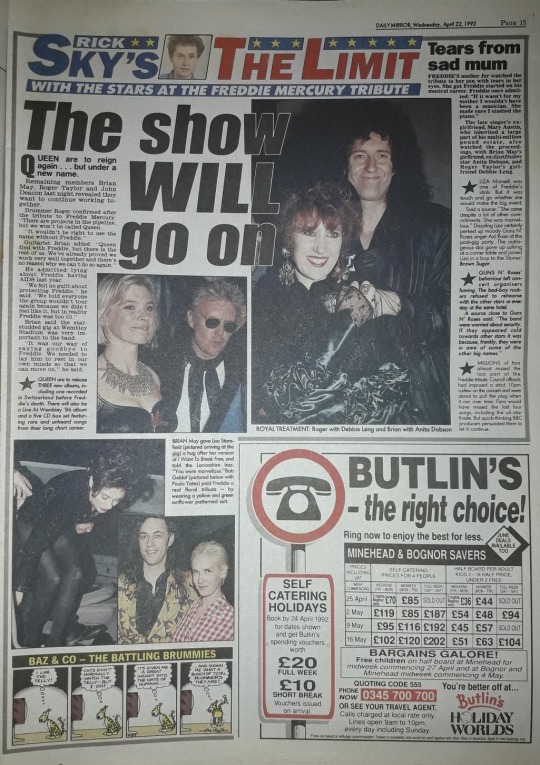
Daily Mirror - April 22, 1992
Credits to Roberto Macchi.
RICK SKY’S THE LIMIT WITH THE STARS AT THE FREDDIE MERCURY TRIBUTE
THE SHOW WILL GO ON
QUEEN are to reign again… but under a new name.
Remaining members Brian May, Roger Taylor and John Deacon last night revealed they want to continue working together.
Drummer Roger confirmed after the tribute to Freddie Mercury: “There are projects in the pipeline, but we won’t be called Queen.
“It wouldn’t be right to use the name without Freddie.”
Guitarist Brian added: “Queen died with Freddie, but there is the rest of us. We’ve already proved we work very well together and there’s no reason why we can’t do so again.”
He admitted lying about Freddie having AIDS last year.
“We felt no guilt about protecting Freddie,” he said. “We told everyone the group wouldn’t tour again because we didn’t feel like it, but in reality Freddie was too ill."
Brian said the star-studded gig at Wembley Stadium was very important to the band.
“It was our way of saying goodbye to Freddie. We needed to lay him to rest in our own minds so that we can move on," he said.
• QUEEN are to release THREE new albums, including one recorded in Switzerland before Freddie's death. There will also be a Live At Wembley '86 album and a five CD box set featuring rare and unheard songs from their long chart career.
[Photo caption: BRIAN May gave Lisa Stansfield (pictured arriving at the gig) a hug after her version of I Want To Break Free, and told the Lancashire lass: "You were marvellous." Bob Geldof (pictured balow with Paula Yates) paid Freddie a real floral tribute — by wearing a yellow and green sunflower patterned suit.]
[Photo caption: ROYAL TREATMENT: Roger with Debbie Leng and Brian with Anita Dobson]
Tears from sad mum
FREDDIE'S mother Jer watched the tribute to her son with tears in her eyes. She got Freddie started on his musical career. Freddie once admitted: "If it wasn't for my mother I wouldn't have been a musician. She made sure I studied the piano.”
The late singer's ex-girlfriend, Mary Austin, who inherited a large part of his multi-million pound estate, also watched the proceedings, with Brian May's girlfriend, ex-EastEnders star Anita Dobson, and Roger Taylor's girlfriend Debbie Leng.
• LIZA Minnelli was one of Freddie's idols. But it was touch and go whether she would make the big event.
Said a source: "She came despite a lot of other commitments. She was marvellous." Dazzling Liza certainty perked up moody Guns N’ Roses singer Axl Rose at the post-gig party. The outrageous star gave up sulking at a comer table and joined Liza in a bop to the Stones’ Brown Sugar.
• GUNS N’ Roses' behaviour left concert organisers fuming. The bad-boy rockers refused to rehearse with the other stars or even stay at the same hotel.
A source close to Guns N’ Roses said: "The band were worried about security. If they appeared cold towards other stars it was because, frankly, they were in awe of some of the other big names."
• MILLIONS of fans almost missed the last part of the Freddie tribute. Council officials had imposed a strict 10pm curfew on the concert and were about to pull the plug when it ran over time. Fans would have missed the last four songs, including the all-star finale. But quick-thinking BBC producers persuaded them to let it continue.
#queen#queen band#roger taylor#freddie mercury#brian may#queen scans#daily mirror april 1992#anita dobson#debbie leng#lisa stansfield#bob geldof#paula yates#liza minnelli#guns n roses#axl rose
29 notes
·
View notes
Text
For years I've had The Hollow Crown on my "to watch" list because I'm a slut for Tom Hiddleston and I finally found a streamer to watch it on without signing up for BritBox which I stubbornly refuse to do (i already pay a license fee BBC so bugger off with that!)
Anyway he makes a super hot Henry V (as expected) and I def prefer him to twinky child Timothy Chalamet in the Netflix version of the story. Wholeheartedly recommend watching it if you like Hiddles and Shakespeare.
Anyway I'm also a slut for anything War of the Roses and it turns out The Hollow Crown continued with Henry VI so I put that on next. Imagine my surprise when I realised tumblrs NEW favourite British Boy played Henry VI!
Our pouty emo boy Tom Sturridge plays Henry VI brilliantly. Why is he so good at being pathetic little wet cats?! He's all emotional and faints at one point from grief and shock. I think Tumblr would enjoy it.
I haven't watched Henry VI part 2 yet, though I know this story doesnt end well for him! But Eh, thats England in the Middle Ages for you.
If you can, go watch the Hollow Crown! (Oh and if you are a fan of Bendadick Cucumberpatch apparently he plays Richard III in the part after Henry VI! An apt choice for the original villainous usurper king!
Basically what I have learned from this is that we really do only have like 5 main actors and if you dig through enough BBC/ITV period dramas you will come across all of them several times over.
(It also seems rather fitting that Tom Sturridge played Tom Hiddlestons son, and also appears to have inherited Hiddles Tumblr throne of fave dark haired emo immortal god like being - I find it amusing anyway)
#this post has no real purpose#but may be of interest to some people i guess#the hollow crown#tom hiddleston#tom sturridge
45 notes
·
View notes
Text
Why I love the Spymaster #102: He's the girl with a pearl earring!
Find my full series under the HELP I WUVS HIM tag.
I talk about the Spymaster's use of classic paintings of modern Western art in The Power of the Doctor elsewhere in my list. #61: Playing even more with gender! notes that he substitutes himself in three paintings into the position of women. #79: The Scream! 💔 points out that his use of the painting illustrates his struggles with mental health. #100: His art collection! examines why he turns to famous paintings that are considered classics. #101: He's the Mona Lisa! talks about the reasons for his self-insertion in that painting.
Today we're looking at the Spymaster sticking himself in the place of the subject of Girl with a Pearl Earring, a painting from about 1665, by Johannes Vermeer.
Here's a reproduction of the original:
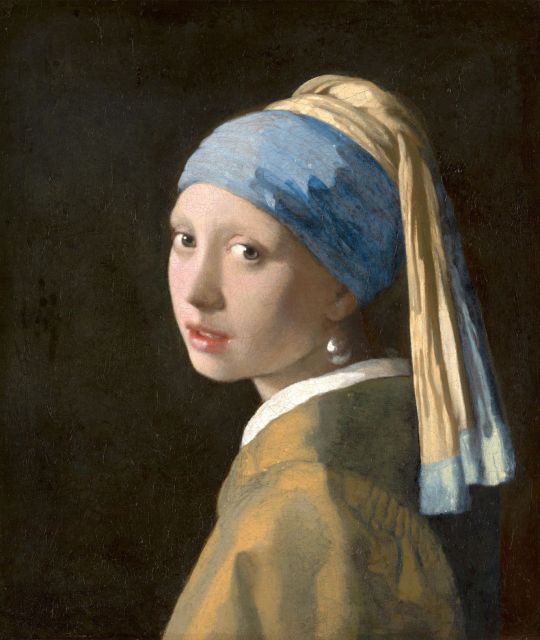
And here's the Spymaster's version:

Two things about this painting jump out at me:
First, the subject, a white European young woman, is dressed in a turban, which was a reference to Turkish dress and therefore considered intriguingly foreign. With his extremely bushy beard, the Spymaster enhances the symbols of "exoticism" and "foreignness." He's also brown-skinned and therefore more easily interpretable as "not from around here" and even "exotic" [in implicit juxtaposition with white people].
I'm frankly not sure how to read the use of signs of "exoticism" and racial difference. The show and the BBC have a long history of ignoring the races of the actors and characters, thus contributing to nasty racial stereotypes. [See #51 for an extended discussion of the BBC's avoidance of Thirteen and the Spymaster's race and gender in Spyfall and Spyfall I and how it reinforces racist and sexist assumptions.] Given the show's refusal to significantly engage with the different lived experiences that people have based on their race, I highly doubt that the showrunners even thought about the fact that the Spymaster, who is not white, is putting himself in the role of a white woman. I'd love to read this as the Spymaster's playful commentary on the constructed, artificial nature of "exoticism" and race, but, even though he clearly knows about identity politics [#14: He exploits a modern social justice activist perspective!], we have no indication that he applies them to himself. So idk.
Second, the subject has a very interesting expression. Her twisted neck and side glance indicate that she is looking over her shoulder, a gesture that is often associated with being startled or surprised. Her open mouth makes her look like she is gasping or about to speak. She's responding to the observer, perhaps even in dialogue with them. She looks anxious, or, at the very least, uncertain.
By contrast, the Spymaster's version of this painting shows him in profile. He makes no eye contact with the viewer, and his facial expression seems neutral. Focused on something else that we cannot see, he appears indifferent to the fact that he's being watched.
The Spymaster would like to present himself as in his version of Girl with a Pearl Earring: the beautiful, brilliant center of attention who's not preoccupied with whether he's being looked at. The original Girl..., however, portrays his emotional state more accurately: one of heightened self-awareness, tension, and worry.
@sclfmastery @natalunasans @rowanthestrange @timeladyjamie @whovianuncle
#the spymaster#HELP I WUVS HIM#spymaster#the master#the power of the doctor#doctor who#dw meta#girl with a pearl earring#johannes vermeer#sneaking into the classics again#sacha dhawan#the extremely worried girl with a pearl earring
10 notes
·
View notes